June 21, 2025 | 01:01 GMT +7
June 21, 2025 | 01:01 GMT +7
Hotline: 0913.378.918
June 21, 2025 | 01:01 GMT +7
Hotline: 0913.378.918
The Mekong River flows from China into Laos at Pak Namla village, Luang Namtha province and then makes a journey along the country's border with Myanmar and Thailand before parting at Donsadam, Champasak province. During that journey, it is not known how many lands the river flowed through, but there is a very special place - the ancient capital of Luang Prabang.
Southivone Vannasy, nicknamed Ou Le, our Lao translator, said, “With nearly 60 ancient villages combined with cities, unique architecture, religion, national culture, hundreds of “Wat” (temples) large and small, Wat Xieng Thong, Kuang Si waterfall, and Mount Phousi Luang Prabang is the most famous tourist city of the country of a Million Elephants. The Laotians have a saying: If you have not been to Luang Prabang, you have not been to our country".
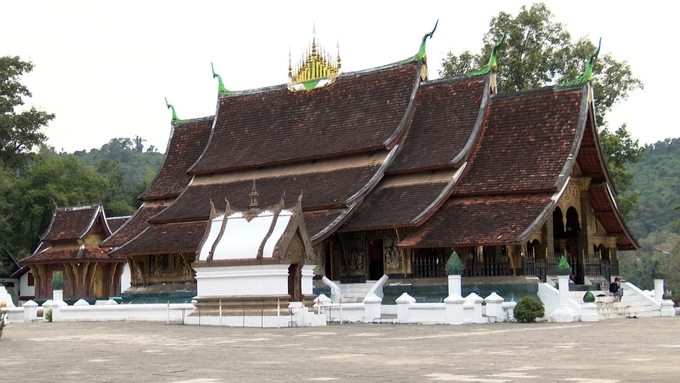
Wat Xieng Thong, the symbol of Luang Prabang.
In the Lao language, Luang Prabang means “Royal Buddha Image”, and the Vietnamese who come here often call it "Luang" for short. The morning “Luang” is beautiful and peaceful. Cool fresh air. Old quarters, ancient temples with curved roof architecture. Monks going on alms round the street. The Mekong River also flows around the city with a calming demeanor.
Perhaps because it is a city of Buddhism, everything here feels so slow. “Luang” has no traffic lights, no taxis. The Laotians call the ancient capital "the city of giving way". People participating in traffic do not jostle or honk horns at each other. If the road is too crowded or they are going through a fork or intersection, those who are in an urgent situation would flash the light to ask for a path. Blinking the first time means “I am in a hurry”, the second time means “I am in an emergency”, and blinking continuously or honking the horn means they are someone from another country is coming to “Luang”, not Laotian.
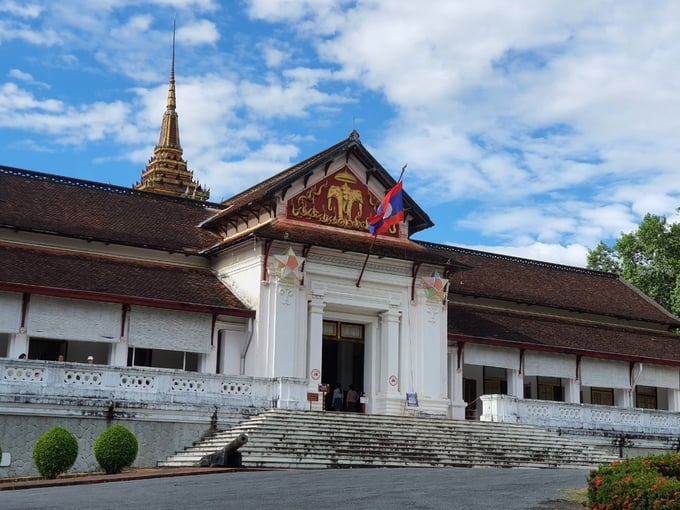
Royal Palace in Luang Prabang.
Luang Prabang is the center of 8 provinces in Northern Laos. The “land of Buddha” is famous for three things: tourism, agriculture and hydroelectricity, with 65% of the population lives on agriculture. In 2021, the province's rice growing area reached 43,000 ha of upland rice and 27,000 ha of wetland rice. Despite having encouragement from the Lao government to organize large-scale cattle raising for export to China and 200,000 ha of grassland, so far Luang Prabang has only 200,000 cows and 50,000 buffaloes. 83 Livestock farms in the province are still mainly smallholder farming households. People's lives thus still face many difficulties.
Muang Khai is an ancient fishing village of the Lao Loum people of more than 700 years of age, located on the banks of the Mekong River in Luang Prabang district, about 20 km from the ancient capital of Luang Prabang. We came to Muang Khai early in the afternoon to join a fishing journey on the river with the people the next day.
There are 130 households in the village who have lived on the river for many generations. The men fish and the women do embroidery, take care of housework, and in the afternoon, they would meet at the temples next to the river, in a peaceful corner. The Lao Loum, or any other ethnic group in the country of a million elephants, considers the temple to be the face of the village.
The temples of Muang Khai village look quite large and dignified. Every morning, whenever the monks in the temple go for alms, the old people of the village would always get up very early to cook sticky rice or something for the people who look after the temple. Laos is a Buddhist country, so the monks are the most respected people. Almost everything in the village includes the monk’s attendance, and the people will ask them to tie the thread for blessings.
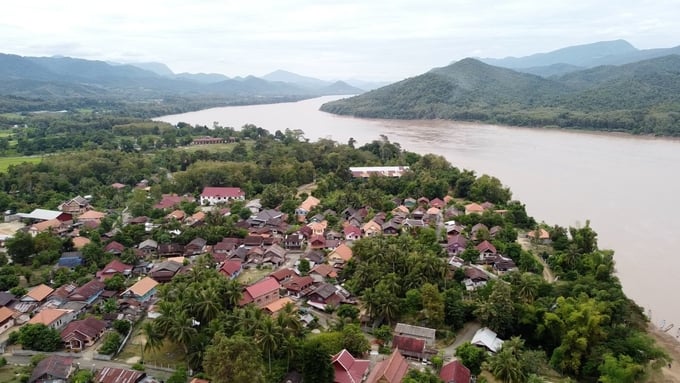
A corner of Muang Khai.
The story of temples and monks gradually turned to the theme of rivers. Village chief Sunthon Phonsavat said, “The river is forgiving and generous. For Muang Khai, the river is not only a source of livelihood but also a cultural identity of our village. And the whole nation seems to think so too. The river is a natural resource that we Laotian normally liken to the blood that feeds the people from the North to the South.”
Somchit Inthavong is one of the people who still stick to the traditional fishing profession in Muang Khai. The old fisherman cast the net while remembering the old days. A day not far away, fish and shrimp on the Mekong River were uncountable. Just threw the net down, and a few minutes later the net was already loaded. Thanks to mother nature, catching over 30kg of trout and catfish was a common story. Although the fishing industry did not create a fortune, the people still thought of it as a livelihood good enough to bring food to the table.
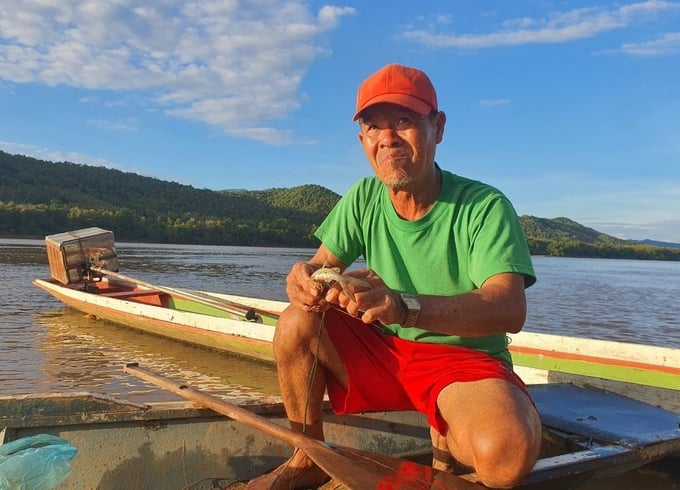
Somchit Inthavong the old fisherman.
However, in recent years, fish and shrimp have not yet been on a brink of exhaustion, but the results of a day's labor have been much less than before. The nets feel lighter day by day. One whole morning with 6 - 7 "heu" (boats), and Muang Khai fishermen only get a few fish and shrimp. There are days when Somchit Inthavong caught a snakehead weighing more than 6kg, but many others returned empty-handed. Our fishing trip soon came to an end, left with headshakes and sad smiles.
When fishing in the Mekong River seems to be getting more and more difficult, Muang Khai villagers have shifted their attention to agritourism and ecotourism. It is actually a very good idea. Rice fields, elephant conservation areas, cattle herds along with natural scenery of Muang Khai turned out to have many values this whole time but the people have not yet know how to utilize them.
Here lies an ecotourism area of nearly 50 ha, which was originally the villager's farming land. Only able to cultivate one crop on these fields in the past, people have then joined hands to build a system of irrigation canals so that they could grow rice from July to April next year. The rice grown is not only to wait for harvest but also turns this place into an attractive ecotourism destination.
Another mentionable example is the unique buffalo milking experience tourism model right at the foot of Kuang Si falls. Tourists coming to the village can both directly experience milking and enjoy yogurt, cheese, and confectionery made from buffalo milk, and people seem to like this concept a lot.
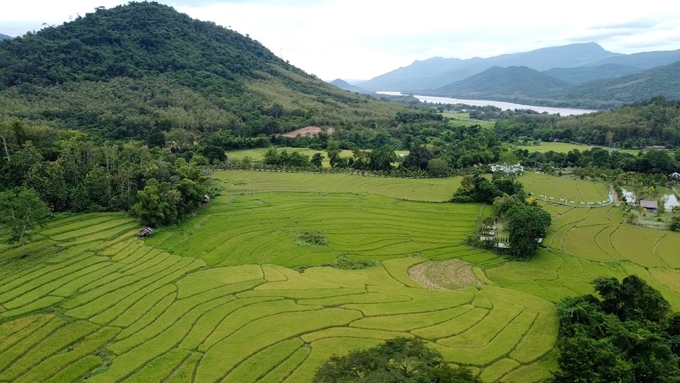
Tourists coming to Luang Prabang will not only be immersed in the space of ancient cultural values but can also experience peaceful and fresh country tourism.
Or like Luang Prabang Elephant Camp locates right in the center of the village. Once thought of as a place to just preserve the country's symbolic animals, Muang Khai people today have known how to make money. Tourists are welcome to watch without tickets, and they can buy things like bananas and sugarcane to feed the elephants. The villagers even teach elephants how to say "khobchai" (thank you) every time a guest spends money to buy food for them.
Along the banks of the Mekong River flowing through the ancient capital of Luang Prabang, there are many villages like Muang Khai now. Tourists coming to Luang Prabang will not only be immersed in the space of ancient cultural values but can also experience peaceful and fresh country tourism. Muang Khai people have been changing to awaken and promote the values of the land and the people here, changing to adapt to a new life, no longer relying too much on the resources of the river that is changing and gradually exhausted.
Translated by Samuel Pham
/2025/06/17/3942-2-143243_548.jpg)
(VAN) Recently, in Sweden, the Secretary of the Binh Dinh Provincial Party Committee presented the Investment Registration Certificate for the 'Polyester Fabric Recycling Complex' project to SYRE Impact-AB Company.
/2025/06/12/3721-2-202745_83.jpg)
(VAN) TH made an impression at Seoul Food 2025 with its line of natural beverages, paving the way for Vietnamese food products to enter the South Korean market.

(VAN) Soc Trang's success in rice exports stems from a strategy of developing fragrant and specialty rice cultivation areas and standardizing production toward low-emission practices.
/2025/06/11/1311-5-120811_839.jpg)
(VAN) The pig farming industry is facing the challenge of comprehensive restructuring to meet requirements for quality, safety, traceability, and market expansion both domestically and for export.

(VAN) Vietnam considers participating in ALGROALBA in order to expand agricultural production, coordinate the assessment and effective exploitation potential land.
/2025/06/05/5314-1-184727_407.jpg)
(VAN) From seemingly worthless fish scales and skin, enzymes and lactic ferments can transform by-products into peptides, opening a sustainable, effective business direction and elevating Vietnamese seafood.

(VAN) TTC AgriS and IFC signed a strategic partnership to develop a sustainable agricultural value chain, aiming to achieve the Net Zero target by 2035.